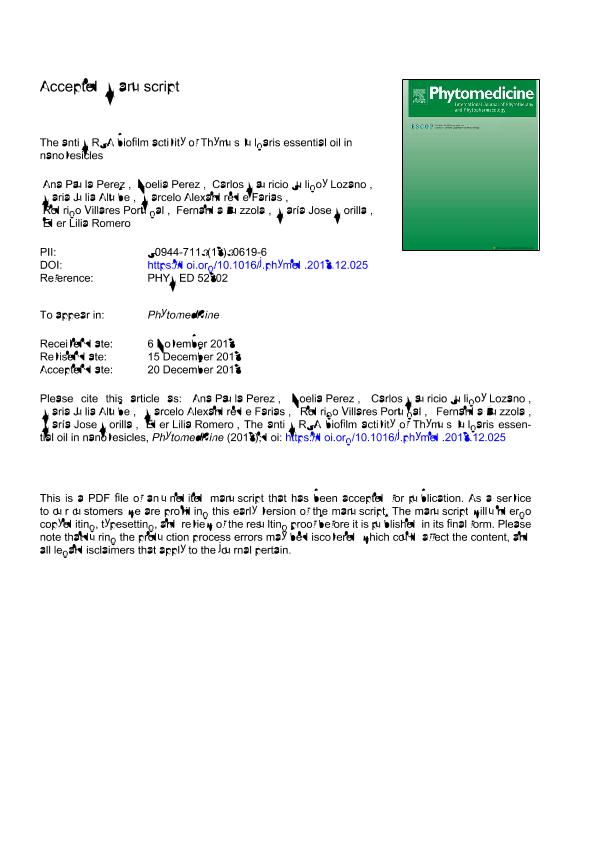Artículo
The anti MRSA biofilm activity of Thymus vulgaris essential oil in nanovesicles
Perez, Ana Paula; Perez, Noelia Soledad ; Suligoy Lozano, Carlos Mauricio
; Suligoy Lozano, Carlos Mauricio ; Altube, María Julia
; Altube, María Julia ; de Farias, Marcelo Alexandre; Portugal, Rodrigo Villares; Buzzola, Fernanda Roxana
; de Farias, Marcelo Alexandre; Portugal, Rodrigo Villares; Buzzola, Fernanda Roxana ; Morilla, María José
; Morilla, María José ; Romero, Eder Lilia
; Romero, Eder Lilia
 ; Suligoy Lozano, Carlos Mauricio
; Suligoy Lozano, Carlos Mauricio ; Altube, María Julia
; Altube, María Julia ; de Farias, Marcelo Alexandre; Portugal, Rodrigo Villares; Buzzola, Fernanda Roxana
; de Farias, Marcelo Alexandre; Portugal, Rodrigo Villares; Buzzola, Fernanda Roxana ; Morilla, María José
; Morilla, María José ; Romero, Eder Lilia
; Romero, Eder Lilia
Fecha de publicación:
04/2019
Editorial:
Elsevier Gmbh
Revista:
Phytomedicine
ISSN:
0944-7113
Idioma:
Inglés
Tipo de recurso:
Artículo publicado
Clasificación temática:
Resumen
Background: Thymus vulgaris essential oil (T) could be an alternative to classical antibiotics against bacterial biofilms, which show increased tolerance to antibiotics and host defence systems and contribute to the persistence of chronic bacterial infections. Hypothesis: A nanovesicular formulation of T may chemically protect the structure and relative composition of its multiple components, potentially improving its antibacterial and antibiofilm activity. Study design: We prepared and structurally characterized T in two types of nanovesicles: nanoliposomes (L80-T) made of Soybean phosphatidylcholine (SPC) and Polysorbate 80 (P80) [SPC:P80:T 1:0.75:0.3 w:w], and nanoarchaeosomes (A80-T) made of SPC, P80 and total polar archaeolipids (TPA) extracted from archaebacteria Halorubrum tebenquichense [SPC:TPA:P80:T 0.5:0.50.75:0.7 w:w]. We determined the macrophage cytotoxicity and the antibacterial activity against Staphylococcus aureus ATCC 25,923 and four MRSA clinical strains. Results: L80-T (Z potential −4.1 ± 0.6 mV, ∼ 115 nm, ∼ 22 mg/ml T) and A80-T (Z potential −6.6 ± 1.5 mV, ∼ 130 nm, ∼ 42 mg/ml T) were colloidally and chemically stable, maintaining size, PDI, Z potential and T concentration for at least 90 days. While MIC 90 of L80-T was > 4 mg/ml T, MIC 90 of A80-T was 2 mg/ml T for all S. aureus strains. The antibiofilm formation activity was maximal for A80-T, while L80-T did not inhibit biofilm formation compared to untreated control. A80-T significantly decreased the biomass of preformed biofilms of S. aureus ATCC 25,923 strain and of 3 of the 4 clinical MRSA isolates at 4 mg/ml T. It was found that the viability of J774A.1 macrophages was decreased significantly upon 24 h incubation with A80-T, L80-T and T emulsion at 0.4 mg/ml T. These results show that from 0.4 mg/ml T, a value lower than MIC 90 and the one displaying antibiofilm activity, with independence of its formulation, T significantly decreased the macrophages viability. Conclusion: Overall, because of its lower MIC 90 against planktonic bacteria, higher antibiofilm formation capacity and stability during storage, A80-T resulted better antibacterial agent than T emulsion and L80-T. These results open new avenues to explode the A80-T antimicrobial intracellular activity.
Palabras clave:
ANTIBIOFILM ACTIVITY
,
NANOVESICLES
,
THYMUS VULGARIS ESSENTIAL OIL
Archivos asociados
Licencia
Identificadores
Colecciones
Articulos(IMPAM)
Articulos de INSTITUTO DE INVESTIGACIONES EN MICROBIOLOGIA Y PARASITOLOGIA MEDICA
Articulos de INSTITUTO DE INVESTIGACIONES EN MICROBIOLOGIA Y PARASITOLOGIA MEDICA
Articulos(SEDE CENTRAL)
Articulos de SEDE CENTRAL
Articulos de SEDE CENTRAL
Citación
Perez, Ana Paula; Perez, Noelia Soledad; Suligoy Lozano, Carlos Mauricio; Altube, María Julia; de Farias, Marcelo Alexandre; et al.; The anti MRSA biofilm activity of Thymus vulgaris essential oil in nanovesicles; Elsevier Gmbh; Phytomedicine; 57; 4-2019; 339-351
Compartir
Altmétricas



